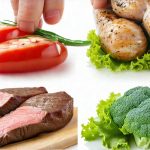The experience is unfortunately common: enjoying a seemingly harmless dinner – perhaps pizza, pasta, white rice with stir-fry, or even a large dessert featuring refined sugars – only to find yourself rushing to the bathroom hours later with diarrhea. It’s not necessarily a sign of food poisoning or a serious illness; often, it’s a direct consequence of how our bodies process (or struggle to process) large amounts of refined carbohydrates. This isn’t about avoiding carbs altogether; it’s understanding why certain types trigger digestive upset and what steps can be taken to mitigate the discomfort. Many people unknowingly contribute to this cycle through habitual dietary choices, and recognizing the connection is the first step toward a healthier gut.
This phenomenon stems from the way our digestive system interacts with different carbohydrate structures. Complex carbohydrates, found in whole grains, vegetables, and fruits, are broken down more slowly, providing a sustained release of energy and generally being easier on the system. Refined carbs, however, lack the fiber and nutrients that slow digestion, leading to rapid spikes in blood sugar and potentially overwhelming the gut’s capacity to process them efficiently. This rapid transit time can result in undigested carbohydrates reaching the large intestine, where bacteria ferment them, producing gas, bloating, and ultimately, diarrhea in some individuals. It’s important to remember individual sensitivities vary greatly; what triggers one person may not affect another.
The Role of Osmotic Diarrhea & Rapid Transit
Osmotic diarrhea is frequently at play when heavy refined carb dinners are the culprit. This type occurs when there’s an excessive amount of fluid drawn into the intestines, leading to loose, watery stools. Refined carbohydrates, because they aren’t effectively absorbed in the small intestine, create a higher osmotic pressure within the gut lumen. Essentially, water is pulled into the large intestine to try and dilute the undigested sugars, resulting in diarrhea. The more refined carbs consumed, the greater the osmotic imbalance and the more pronounced the effect.
The speed at which food moves through your digestive system – known as gastrointestinal transit time – also plays a critical role. Refined carbohydrates are digested quickly, accelerating this transit time. This leaves less opportunity for proper nutrient absorption in the small intestine and increases the likelihood of undigested carbs reaching the colon. A slower, more consistent digestion process, facilitated by fiber-rich foods, allows for better absorption and reduces the risk of osmotic imbalances. Think about the difference between a slowly simmered oatmeal versus a quickly consumed sugary cereal – one provides sustained energy and digestive comfort, while the other can lead to a rapid crash (and potentially diarrhea). Understanding key takeaways from tracking your digestion can help you understand these patterns.
Furthermore, some individuals may have underlying sensitivities or intolerances that exacerbate these effects. For instance, those with mild fructose malabsorption might find even moderate amounts of refined sugars problematic, leading to more severe symptoms than someone without this condition. It’s not always about the quantity; it’s about how your body specifically responds. If you suspect a deeper issue, signs from testing might reveal gut lining damage that needs addressing.
Identifying Trigger Foods and Portion Control
Pinpointing which refined carbs are most problematic for you can significantly reduce instances of post-dinner diarrhea. This requires a bit of self-observation and potentially keeping a food diary. – Start by listing common culprits: white bread, pasta made from white flour, sugary cereals, pastries, cakes, cookies, sweetened beverages, and even seemingly innocuous foods like instant mashed potatoes. – Pay attention to the amount you consume – larger portions are more likely to trigger symptoms. – Note any accompanying symptoms beyond diarrhea, such as bloating, gas, or abdominal cramping.
A useful strategy is an elimination diet, done cautiously and ideally with guidance from a healthcare professional. This involves removing suspected trigger foods for a period (e.g., 2-4 weeks) and then reintroducing them one at a time to see if symptoms reappear. Portion control is also paramount. Even if you don’t eliminate a food entirely, reducing the amount you eat can often prevent digestive distress. Instead of an entire pizza, perhaps opt for a single slice with a side salad. Small changes can make a big difference. Understanding what you can learn from testing after switching diets can help guide this process.
The Importance of Fiber & Hydration
Counteracting the negative effects of refined carbs requires a proactive approach to gut health. Fiber is your ally here. It slows down digestion, promotes regular bowel movements, and adds bulk to stool, helping to regulate intestinal transit time. Incorporating fiber-rich foods into your diet – whole grains, fruits, vegetables, legumes, and nuts – can help offset the impact of occasional refined carb indulgences. However, it’s crucial to increase fiber intake gradually to avoid exacerbating bloating or gas.
Hydration is equally important. Diarrhea itself leads to fluid loss, so replenishing fluids is vital. Water is best, but electrolyte-rich drinks (like coconut water) can also be helpful in restoring balance. Avoid sugary beverages, as they can worsen osmotic diarrhea. Furthermore, consider the timing of hydration – drinking water with your meal can aid digestion and prevent constipation, which indirectly supports healthy bowel function. Recognizing dehydration from diarrhea is also crucial, especially in children.
Gut Microbiome & Long-Term Dietary Changes
The gut microbiome—the trillions of bacteria residing in our digestive tract—plays a surprisingly significant role in carbohydrate metabolism. A diverse and balanced microbiome is better equipped to handle complex carbohydrates and minimize the fermentation of undigested sugars, reducing gas production and diarrhea risk. Refined carbs can negatively impact this balance, feeding less beneficial bacteria and potentially disrupting the ecosystem. GI diagnostics are helpful for understanding these imbalances.
Long-term dietary changes are often necessary to address chronic issues related to refined carb consumption. This doesn’t mean complete deprivation; it means prioritizing whole, unprocessed foods as the foundation of your diet. – Gradually replace refined grains with whole grains (brown rice, quinoa, whole wheat bread). – Choose fruits and vegetables over sugary desserts. – Limit processed foods containing added sugars. – Consider incorporating probiotic-rich foods (yogurt, kefir, sauerkraut) to support a healthy gut microbiome. These aren’t quick fixes but rather sustainable lifestyle adjustments that promote overall digestive health and reduce the likelihood of experiencing diarrhea after heavy carb dinners. Ultimately, listening to your body and making informed choices about what you eat is key to managing this common digestive issue. Signs from test results can help guide these long-term changes.


















